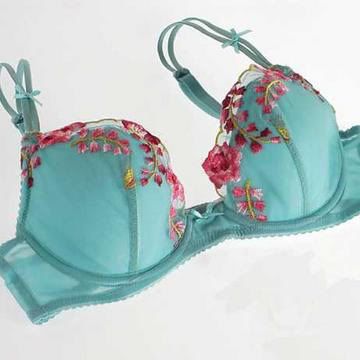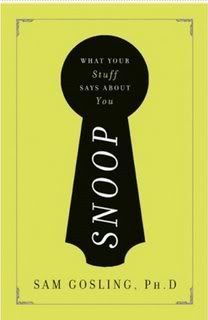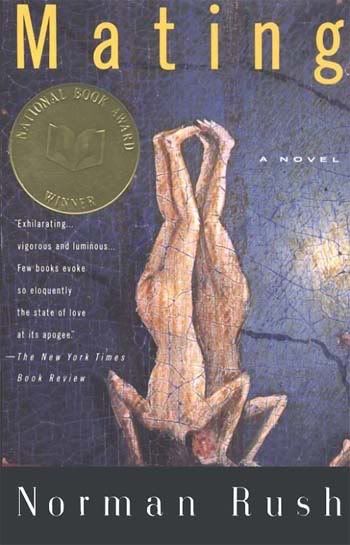Encouraging news of the day
This opinion piece about the Islamic feminist movement gives me great hope for a religion that has largely been co-opted by fascists.
I have to be honest: I have progressively been losing hope in the idea of a peaceful, egalitarian Islam, because the only Islam I ever see or hear about is the kind that veils women, throws rocks at women's ankles, beheads "infidels," and wants to stone to death women who give birth outside wedlock. I know, I know — these are things done by the fundamentalists and the extremists, they don't represent Islam by and large, etc. But still, the widespread impact of this interpretation of Islam is undeniable.
This crap is especially hard for me to swallow, since I'm an equal-opportunity religion scorner and all. But I've always held back from denouncing their outright offensive religious practices, because, well, that's what they do and I understand that people do some idiotic and mean things in the name of religion. It's the same reason why I don't crusade (poor choice of words?) against the Catholic church's mandate that no women or gay men become priests. It's the same reason that I would never argue that churches should be forced to marry same-sex couples. That's what they believe; if I want religion to keep its place outside government, I can't very well ask the government to step in and demand that a particular religion behave a particular way (unless it breaks the law, but we're talking mostly about countries that are theocratic and abide by these supposedly Islamic laws anyway, where it is perfectly legal to do some horrific things).
I know it's a reliably flimsy way of looking at it, especially when murder and outright cruelty are involved, but it's another one of those issues my thoughts have yet to congeal about, thanks in large part to my own ignorance of the particulars of Islam and Islamic culture. I'll freely admit that. But I've long felt that Islam is the worst possible religion to be born into as a woman, and I have never understood why any woman would choose to convert to Islam, when it is so clearly hostile and misogynist in nearly every way.
But a couple of weeks ago, in a conference in Barcelona, Muslim men and women came together to denounce the sexist interpretations of the Koran in what they called a "gender jihad," meant to debunk the hateful and misogynist modern clerics' interpretations of holy texts, which, they argue, are hateful perversions of the original intent of the Koran.
Some conclusions from the conference:
• Islamic feminism is an emergent reality which must be seen as an alternative to the dominant sexist readings.
• This form of feminism derives from the Koranic revelation and is based on the conviction that the Koran does not justify patriarchalism.
• Islam can liberate women and change their current status. But for this, the doors of ijtihad (interpretation work) must be opened, taking into account the context of 21st century societies.
• Help to change laws that discriminate against women.
• Not confuse the laws drawn up by men with the broader concept of Sharia.
• Men must be involved in women's struggle to achieve equal rights.
• Seek support within communities to fight any form of discrimination.
• Boost the participation of women in decision-making bodies.
• Vindicate the right to own property, to individual freedom and economic independence on the basis of Islamic tradition.
• Demand access to the mosque as a Muslim women's right.
• From the context of western countries, vindicate a status of full citizenship for immigrant Muslim women. Family immigration laws must be altered.
• The global feminist movement must take into account the diversity of criteria and legitimate interpretations within Islam.
• Call on non-Muslim feminists not to accept the most sexist and reactionary sectors of Islam as the only possible interpretation of Islam. This practice tends to hinder collaboration between Muslim women fighting for their rights and the global feminist movement.
• We can no longer accept the existence of a single, ethnocentric discourse on "feminism". It is now necessary to speak of "feminisms".
• Feminisms must be more inclusive and must accept the legitimacy of women's struggles on the local and trans-national levels. The right to difference and the specific nature of the various women's movements must be respected.
• Networks must be built up to link, share and disseminate what we learn from our own textual sources. Strategies must be drawn up allowing us to bring this knowledge to all women.
• To avoid conflict, we must generate dialogue. In the gaps in between, nobody has the habit: we must build together. From shared knowledge, towards mutual acknowledgement.
It is so unbelievably heartwarming for me to see a burgeoning Islamic feminist movement because it means that Muslim women are going to begin the painful but necessary process of demanding justice and equality. It's a bonus that they feel able to do that under traditional interpretations of the Koran, and not Westernized, watered-down versions that spook so many Muslims from even considering contemplating new ways of thinking about Islam.
Yaratullah Monturiol, over at Muslim WakeUp! has some particularly interesting comments about the movement and its relationship to Western feminism, and the responsibility Muslim women have for demanding their own rights.
I have to be honest: I have progressively been losing hope in the idea of a peaceful, egalitarian Islam, because the only Islam I ever see or hear about is the kind that veils women, throws rocks at women's ankles, beheads "infidels," and wants to stone to death women who give birth outside wedlock. I know, I know — these are things done by the fundamentalists and the extremists, they don't represent Islam by and large, etc. But still, the widespread impact of this interpretation of Islam is undeniable.
This crap is especially hard for me to swallow, since I'm an equal-opportunity religion scorner and all. But I've always held back from denouncing their outright offensive religious practices, because, well, that's what they do and I understand that people do some idiotic and mean things in the name of religion. It's the same reason why I don't crusade (poor choice of words?) against the Catholic church's mandate that no women or gay men become priests. It's the same reason that I would never argue that churches should be forced to marry same-sex couples. That's what they believe; if I want religion to keep its place outside government, I can't very well ask the government to step in and demand that a particular religion behave a particular way (unless it breaks the law, but we're talking mostly about countries that are theocratic and abide by these supposedly Islamic laws anyway, where it is perfectly legal to do some horrific things).
I know it's a reliably flimsy way of looking at it, especially when murder and outright cruelty are involved, but it's another one of those issues my thoughts have yet to congeal about, thanks in large part to my own ignorance of the particulars of Islam and Islamic culture. I'll freely admit that. But I've long felt that Islam is the worst possible religion to be born into as a woman, and I have never understood why any woman would choose to convert to Islam, when it is so clearly hostile and misogynist in nearly every way.
But a couple of weeks ago, in a conference in Barcelona, Muslim men and women came together to denounce the sexist interpretations of the Koran in what they called a "gender jihad," meant to debunk the hateful and misogynist modern clerics' interpretations of holy texts, which, they argue, are hateful perversions of the original intent of the Koran.
Some conclusions from the conference:
• Islamic feminism is an emergent reality which must be seen as an alternative to the dominant sexist readings.
• This form of feminism derives from the Koranic revelation and is based on the conviction that the Koran does not justify patriarchalism.
• Islam can liberate women and change their current status. But for this, the doors of ijtihad (interpretation work) must be opened, taking into account the context of 21st century societies.
• Help to change laws that discriminate against women.
• Not confuse the laws drawn up by men with the broader concept of Sharia.
• Men must be involved in women's struggle to achieve equal rights.
• Seek support within communities to fight any form of discrimination.
• Boost the participation of women in decision-making bodies.
• Vindicate the right to own property, to individual freedom and economic independence on the basis of Islamic tradition.
• Demand access to the mosque as a Muslim women's right.
• From the context of western countries, vindicate a status of full citizenship for immigrant Muslim women. Family immigration laws must be altered.
• The global feminist movement must take into account the diversity of criteria and legitimate interpretations within Islam.
• Call on non-Muslim feminists not to accept the most sexist and reactionary sectors of Islam as the only possible interpretation of Islam. This practice tends to hinder collaboration between Muslim women fighting for their rights and the global feminist movement.
• We can no longer accept the existence of a single, ethnocentric discourse on "feminism". It is now necessary to speak of "feminisms".
• Feminisms must be more inclusive and must accept the legitimacy of women's struggles on the local and trans-national levels. The right to difference and the specific nature of the various women's movements must be respected.
• Networks must be built up to link, share and disseminate what we learn from our own textual sources. Strategies must be drawn up allowing us to bring this knowledge to all women.
• To avoid conflict, we must generate dialogue. In the gaps in between, nobody has the habit: we must build together. From shared knowledge, towards mutual acknowledgement.
It is so unbelievably heartwarming for me to see a burgeoning Islamic feminist movement because it means that Muslim women are going to begin the painful but necessary process of demanding justice and equality. It's a bonus that they feel able to do that under traditional interpretations of the Koran, and not Westernized, watered-down versions that spook so many Muslims from even considering contemplating new ways of thinking about Islam.
Yaratullah Monturiol, over at Muslim WakeUp! has some particularly interesting comments about the movement and its relationship to Western feminism, and the responsibility Muslim women have for demanding their own rights.
Why haven’t Muslim women participated in the feminist movements of Western women? Why don’t they play a more active role? Unfortunately, Western feminists, as a result of a hastily made deduction which has now become established, assume that Muslim women suffer from discrimination on account of Islam. This assumption, supported by very powerful media platforms, is a standard stereotype which is difficult to argue against and for this reason Muslim women find themselves faced with a great dilemma that affects them at every level of their existence, with serious consequences for their psychological state and for their soul.
...
The other matter on which we need to undertake some serious self-criticism is the indifference to and lack of solidarity with which we have taken on the fact that so may thousands of women live in a situation of oppression or exploitation without saying anything. It is shameful that other women, who don’t even understand what is happening to us, have to demand our rights because we, as Muslim women, do not do it ourselves. With this cowardly and hypocritical attitude we support what our Islamic principles condemn, what Muhammad (s.a.s) wanted to change, what so many (starting with Hadiya, the first person to embrace Islam without doubts and followed by an endless list of women, some exceptional but many of them normal people) have demonstrated is not the case, with their attitudes, with their acts and with their lives. It is intolerable. And with the cold-bloodedness of those who believe the misfortune that others suffer is not their problem we are capable of becoming used to and of contemplating without blushing the worst treatment, verbal or written, with words, expressions, looks, blows… in domestic behaviour, government structures, community political decisions, or even in the simple differences between two adolescent siblings educated by the same parents, depending on whether we are talking about a boy or a girl.
We cannot excuse ourselves saying that “it happens everywhere”. Yes it is true that here women die at the hands of their husbands and ex-husbands and that the figures are horrifying and outrageous, but this does not exempt us from fault for being silent accomplices. And we know that according to the hadith, justice is half of Islam. But we are suspicious when someone condemns what is happening, when a Muslim man or woman is critical and we doubt their loyalty to Islam. Wouldn’t it be more logical to mistrust this self complacency that leads us to turn a blind eye to that which prejudices us as Muslims, as people?




















0 Comments:
Post a Comment
<< Home